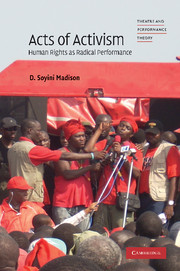Act I - Is it a human being or a girl?
Published online by Cambridge University Press: 04 May 2010
Summary
In Act I we will enter a local debate relative to modernity and tradition and how the bodies of women become the center point of this local conflict, invoking volatile claims about culture, religion, and human rights. We will examine how modes of performance, in the field and on a public stage in Ghana, re-vision the debate and generate alternative claims, questions, and practices.
SCENE ONE: WATCHING 60 MINUTES
It is a Sunday afternoon in May 1998. I am in the kitchen preparing dinner when I hear a man's voice from the television in the next room: “If you roam the Third World on a regular basis like our reporter, you are bound from time to time to come across something that defies belief.” I glance over, it is the investigative news program 60 Minutes, and I see a white female reporter sitting in a small boat being paddled down a river by a black African boy. I leave the kitchen to listen closer. The reporter is in Ghana, West Africa, and she is telling a story of modern-day slavery and sexual servitude where women and girls are taken from their homes and placed in “bondage” to serve a shrine priest.
The reporter speaks with a seven-year-old girl in bare feet wearing a tattered grey cloth wrapped around her small body. The girl is carrying a large bucket of water half her size on her head. The reporter asks her why she was sent to the shrine.
- Type
- Chapter
- Information
- Acts of ActivismHuman Rights as Radical Performance, pp. 34 - 96Publisher: Cambridge University PressPrint publication year: 2010



